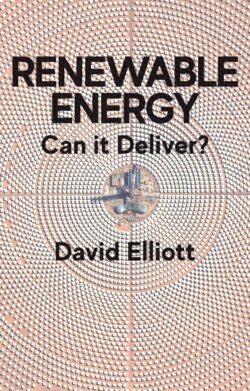Renewable Energy

Реклама. ООО «ЛитРес», ИНН: 7719571260.
Оглавление
David Elliott. Renewable Energy
Contents
Guide
Pages
Dedication
Renewable Energy. Can it Deliver?
Copyright page
Acknowledgements
Boxes
Abbreviations
Preface
1 Introduction: All Change?
The dynamics of technological change
Box 1.1 Energy use and climate issues – an overview
Box 1.2 The new energy options – a summary of impacts and issues
Can renewables deliver?
Policy change – the costs of the transition
Energy metrics and climate impacts – a short guide
Box 1.3 Energy and power units
Box 1.4 Energy end uses and emissions
2 The Renewable Transition
The renewable options
Renewable balancing
Box 2.1 Balancing costs
How rapidly can all this happen?
Box 2.2 System costs, balancing and renewable economics
Some key strategic issues
Box 2.3 Market cannibalization and the race to the bottom
Box 2.4 Scale issues: is small beautiful?
Choices ahead
3 Energy Technologies for the Future
Multiple possible futures
Wind and solar PV dominate
Box 3.1 Some other oil company views on renewables
No to biomass?
Box 3.2 Some UK biomass assessments
No to hydro?
Box 3.3 Hydro pros and cons
Yes to solar heat
The technology mix
4 System Development: Tying It All Together
Grid balancing and system integration
Box 4.1 Battery storage – options and prospects
Box 4.2 Gas storage potentials
The hydrogen economy
Supergrids
Local power smart grid trading
Box 4.3 Smart power-trading systems
Nuclear for balancing?
Box 4.4 Nuclear vs renewables: a UK example
Carbon capture to the rescue?
Box 4.5 CCS potentials and problems
Energy mixes, balancing and integration
Box 4.6 Distribution choices for green heat supply – a UK debate
System reliability, transport and social change
5 The Limits to a Sustainable Future
Sustainable growth?
The limits to technology
Box 5.1 EV impacts and alternatives
Wider energy and resource issues
Box 5.2 Material shortages
Technical fixes and the pace of technical change
Social change
Box 5.3 Energy/carbon rationing
Ultimate limits
Change is possible
6 The Geopolitics of the Transition
Global change
Global energy resource trading
Box 6.1 Global green energy trading – a MENA assessment
Box 6.2 Linking North and South America
Global technology, carbon and materials trading
Global initiatives
Some battle lines ahead
Political futures
Box 6.3 Public attitudes to renewable energy
7 Global Action
Options for global energy change
Box 7.1 Global renewables growth
Europe
Box 7.2 Nuclear phase-out and emissions rises in Germany
The United States of America
Box 7.3 US policy position as reported to the Osaka G20 Summit
China
The rest of the world
Box 7.4 Global investment patterns and sources
Prospects for the future
8 Conclusions
Can it be done?
The growth debate
The green technology option
How much will it cost?
The way ahead
Social and technical change
Afterword: on updates and wider approaches
References
Index
POLITY END USER LICENSE AGREEMENT
Отрывок из книги
To Godfrey Boyle, a friend, colleague and visionary, much missed
There are certainly many who doubt that this is possible. Some critics argue that renewable energy systems are inherently unreliable and expensive, and they look to nuclear power as an alternative non-fossil option, and possibly also to cleaning up fossil fuel use. This book seeks to meet these claims head on and asks to what extent renewables can deliver a technologically and economically viable energy future, and whether other technical options and energy policies to support them are also needed. It explores how important renewable energy technology might be by looking at its progress so far and at its future potential and problems in a context where other approaches are also on offer. Much has been promised from renewables and, so far, they seem to be living up to the promises as they accelerate ahead. This book looks at whether that can and will continue.
.....
The emphasis in this book is on energy policy, in particular the technological choices ahead. I have tried to use plain English and avoid technical terms but, inevitably, getting on top of what is a complex field requires some understanding of basic energy systems and technology and related issues. Box 1.3 provides a short guide to the measurement units used in this book. Perhaps surprisingly, not all of the metrics used are uncontroversial.
The terms ‘power’ and ‘energy’ are sometimes used interchangeably, which can be confusing. In this book, ‘power’ is used to mean electric power, whereas ‘energy’ covers all sources/end uses (power, heat and transport), not just electricity, although of course some electricity is used for heating and for transport.
.....